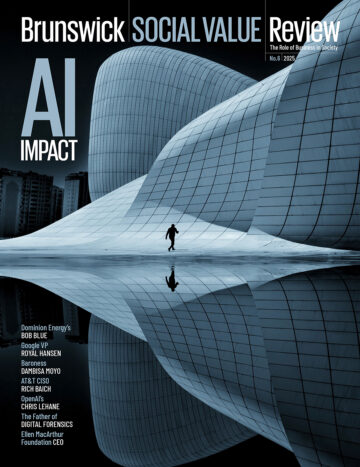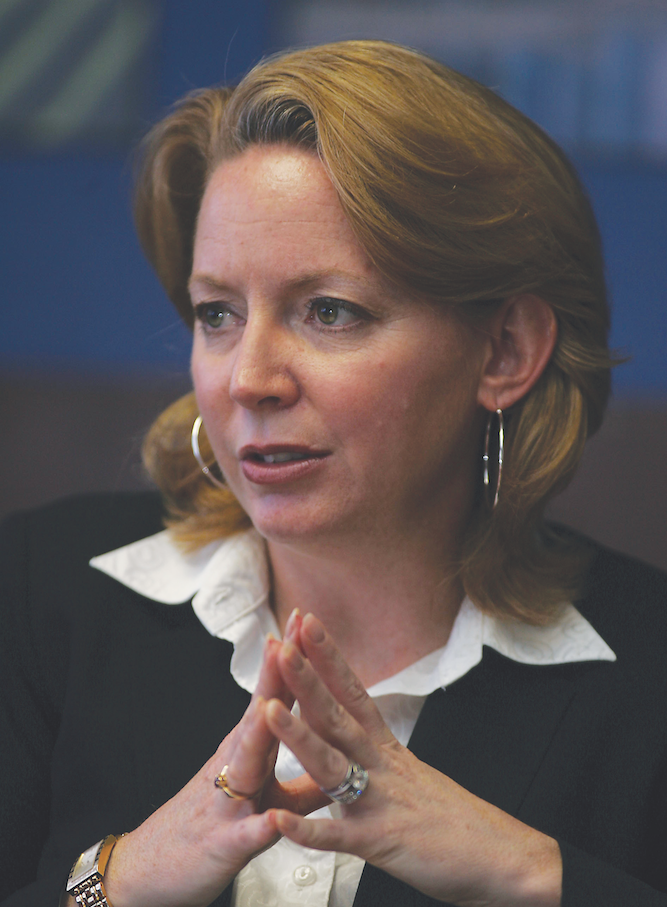Trustpilot CEO Adrian Blair sees AI as vital to fostering trust in every aspect of enterprise. He talks to Brunswick’s Caroline Daniel.
Disembodied personalities interact online as they would in a physical marketplace—sharing posts, selling goods, transacting business. But the lack of face-to-face connection means it is fundamentally harder to trust any of the platforms and people we encounter—making the experience feel more problematic and possibly even dangerous.
Online reviews are a simple, organic means to cultivate trust in this digital landscape and have proven essential, letting the tally of detailed personal experiences inform future potential visitors and customers. Adrian Blair is the CEO of Trustpilot, a business created to facilitate trust through user reviews of companies around the world.
Founded in 2007 in Denmark, Trustpilot had offices in New York and London by 2013. Today, it employs over 1,000 people and millions of reviews are published each month. The company operates on a “freemium” model, with revenue from business subscriptions to their software services. Businesses can’t create or edit reviews of themselves, but can respond to reviews, fostering communication and accountability between consumers and businesses.
Blair joined Trustpilot as CEO in September 2023, leaving a post as Chief Business Officer of Cera, the digital-first healthcare-at-home company. From 2019 to 2022, he was CEO of Dext, the leading SaaS accounting automation platform. From 2011 to 2018, he was Global Chief Operating Officer of Just Eat, where he played a key role in their successful growth and transition from a loss-making startup to a FTSE 100 company.
He spoke to us about the work of Trustpilot and the growing role of AI in building trust online.
Why does Trustpilot need to exist?
Trustpilot is an open platform for feedback on businesses. Anybody who’s had a genuine experience with a company can go on to Trustpilot and leave their honest opinion. We combine that openness with a global audience and breadth across verticals.
Our reviews aren’t just about travel or coffee shops—utility companies, software companies, cybersecurity, telecoms. Our software helps businesses engage and learn from what people are saying about them. We’re independent, so we’re not linked into a closed ecosystem like Amazon reviews.
What attracted you to joining Trustpilot?
Trustpilot’s vision, since it was founded in 2007, is to be the universal symbol of trust. I found that inspiring and something the world clearly needs. Trust has a huge impact on economic growth, across industries and countries. Today, 89% of global consumers check online reviews before making a purchase, according to a UK survey. Nearly half trust them as much as personal recommendations. There is rich evidence of the importance of what we’re doing.
The second reason was huge excitement about the commercial potential. Trustpilot has been around for a long time but is still a very early-stage opportunity. We’ve got over 64 million unique users, and more than a million businesses with reviews, but the need for what we do is far, far greater. There is clear potential to make Trustpilot one of the most successful of all European technology businesses.
“In an AI era, Trustpilot’s vision is more important than ever: to be the universal symbol of trust.”
Why does trust matter for economic growth? Why is it a foundational value?
The author Rachel Botsman describes trust as “a confident relationship with the unknown.” It’s what gets you to part with your money for goods or services. Without trust, transactions get delayed, or they don’t happen, or they happen with the wrong people. All of that friction gums up economies and holds back productivity.
Our software helps businesses. If you’ve got a large volume of feedback, we help distill the key learnings. For example, a logistics business found out from reading Trustpilot reviews that a lot of people were complaining about parcels being chucked into their gardens. That meant they could take action.
How do users’ voices get heard on the platform?
Everybody has an equal voice. We don’t have the concept of “followers” that exists on social media, where algorithms amplify the best-known voices at the expense of the lesser-known majority. On Trustpilot, everybody’s opinion counts. If Elon Musk and my mum each leave a review, as far as Trustpilot is concerned, they are both equally valid accounts, which the business should pay attention to.
How do you calibrate what is an honest, genuinely authentic opinion and get the right balance of content moderation?
Consumers can review any business. This openness and inclusivity is the reason people trust us. We need to stay true to our principles: being impartial between businesses and consumers. We don’t edit somebody’s feedback. We do screen out reviews that contain hateful content or illegal content. But the only person who can edit your review is you. The company itself can’t do it, and we at Trustpilot don’t do it as a matter of policy.
We’ve all heard about rising consumer concern about AI’s ability to generate fake reviews and fake consumers at an unprecedented scale. How do you manage that risk with your platform to maintain its integrity?
We’ve continually invested in advanced fraud detection systems to identify and remove fake reviews. We don’t disclose all the details of how we do that, but we do publish a Transparency Report every year on the volume of fake reviews removed. In 2024 we removed 4.5 million reviews, the vast majority of which never made it to the public-facing platform.
AI has helped us get better at this than ever. We have more than 300 million reviews, with over 100 new reviews being submitted to Trustpilot every minute. That gives us a very good sense of what is normal, expected and what looks suspicious. We’re always training our systems and improving our ability to spot suspicious patterns in the data to remove reviews before they are published.
Do you think the whole issue of trust has become more existential in an AI era?
It’s one of the things that really motivates people here. We’re collecting more feedback than ever from users. The CEO of a major bank told me recently he’s personally reading the bank’s Trustpilot reviews. I start most days by reading our own. They’re not always good, but that’s kind of the point. As a senior executive it’s a great way to cut through the jargon and the layers of management to hear raw customer voices. The noise and chaos of fake content elsewhere just makes what we’re doing even more important.
“If Elon Musk and my mum each leave a review, as far as Trustpilot is concerned, they are both equally valid accounts.”
Do you feel online platforms have a responsibility for free speech?
We’re dealing with two extremes. On the one hand, “free speech” platforms like X and TikTok are a cacophony of voices. Yes, everybody has a voice, but some voices count a lot more than others. It’s hard for companies to actually engage or know what to believe. At the other end, you’ve got platforms for feedback that companies completely control. We call those closed platforms. Companies display reviews, but are very much in control of what is said and revealed to the public. If reviews are completely controlled by businesses, they’re not trusted by buyers.
Trustpilot occupies a very important middle ground. Anyone can leave a review of any experience they’ve had with a business. Businesses can’t stop them. In that sense, we are a free speech platform. But there are tram lines around that free speech: The subject matter needs to be “your experience with the business”—not your cat or your political views. We also of course filter out defamation and hate speech. But you do have total freedom of opinion about your experiences with businesses.
We then make it easy for companies to engage with the feedback. It’s free for them to reply to everything. A lot of our product innovation helps companies understand more deeply the key issues their customers are raising. We essentially say to businesses, “people are talking about you, come and engage with it. Listen, learn and invite more people to leave feedback.” Doing this across countries and industries is a very special position to occupy, and as we become better and better known we start to build a universal symbol of trust.
AI is shifting the boundaries of e-commerce and creating new recommendations and new players. What’s the AI opportunity for you?
One area is making sure that the feedback on companies on Trustpilot is valid and reliable—so utilizing AI to spot the fake reviews and make our platform more useful.
Secondly, AI is bringing our audiences to new places. Our Trustpilot brand reviews are already on Google search results pages. On Google, Trustpilot reviews receive 3.5 billion impressions a month, up 91% year on year. AI is now transforming e-commerce, redefining how consumers discover, evaluate and buy products. Commerce is moving towards new recommendations from LLMs. AI tools must get those recommendations right. If they don’t, consumer trust will be eroded and AI systems undermined. A trusted source of authentic data is critical for that. Trusted reviews are even more necessary on these emerging AI platforms. Everybody with a voice on Trustpilot will be listened to in new ways and that will shape even more buying decisions.
It’s another reason for businesses to listen to their feedback and build their “trust score.” The more impact Trustpilot has, the more benefit there is from engaging with the platform. We’re determined to help more businesses build trust, grow and improve by listening to their customers.
AI has recalibrated the value of historic datasets. Could Trustpilot have a role in embedding trust in other people’s processes or platforms?
Historically, our innovation has been focused on helping a business get more feedback and understanding that feedback. But in addition to that, we have opinions about more than a million businesses around the world on our platform, across industries. Around 150,000 reviews get submitted to Trustpilot every day—and that number is growing all the time. It’s a rich, unique dataset about millions of experiences across the world.
We’ve recently created and launched a new tool called TrustLayer™ [March 2025] making it possible for the first time for businesses to really engage with our collective insights and get value from it. We’re early on this journey, but looking at interesting use cases and collaborations that different kinds of businesses can find with all this data. For example, a private equity firm can get rich insights into the performance of its portfolio of businesses through the lens of their customer feedback.
“We’re determined to help more businesses build trust, grow and improve by listening to their customers.”
So how will your trust insights be embedded into the new ecosystems of business?
We believe Trustpilot’s unique platform and insights are now at the core of consumer behavior, helping businesses build trust. We hope TrustLayer™ will be a way for others to plug into this huge database of opinions about businesses, including those who have not typically been our customers.
Our unique capability has wide potential—ranging from due diligence insights on companies, vetting suppliers or providing broader market-level insights in different markets, and sentiment analysis. Or our insights can help as part of an early warning system for companies concerned about financial fraud. We’re open to exploring lots of different ways people can work with us to embed trust using TrustLayer™. We recently announced, for example, that Advent International, a global private equity investor, and Felix Capital, a venture capital firm, have signed on as flagship partners for TrustLayer™ to provide insights and support strategic decisions.
Regulators are starting to do more around fake reviews and authenticity, amid concerns about rising fraud. How is that having an impact?
In August 2024, the Federal Trade Commission created the rule “Banning Fake Reviews and Testimonials” that allows the agency to strengthen enforcement, seek civil penalties against violators and deter AI-generated fake reviews. The FTC’s decision isn’t just a one-off, it’s a signal to the market that trust is now a fundamental business requirement. For businesses that have operated with integrity, and for consumers, this is a win—it means genuine experiences can stand out. This is a great example of where regulators are promoting healthy capitalism, helping good companies to thrive and bad ones to go out of business. We’ve always believed that at Trustpilot. It’s great to have regulators as an ally in that fight.
Five years from now, what do you want Trustpilot to be known for?
I want Trustpilot to be known for our innovation to amplify real customer voices, and helping companies thrive by engaging with their customers. In an AI era, Trustpilot’s vision is more important than ever: to be the universal symbol of trust.
More from this issue

AI Impact
Most read from this issue

Coming Soon: AGI?





